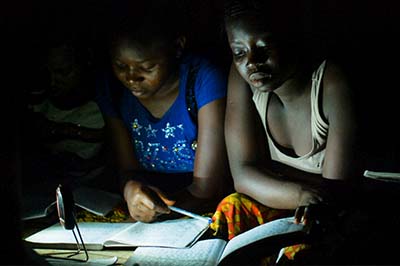
Following in the footsteps of our SunnyMoney student lights campaigns, which have led the way in scaling access to solar lights for millions of people across East Africa, we are pleased that Oxfam has run a pilot following early discussions with our team. Based on our work, this pilot has brought 1,668 solar lights to families in Sierra Leone, West Africa.
Across Sierra Leone, many students need to complete household duties before they can sit down and do their homework during the evening when it’s dark. Without affordable light, this means many students, especially girls, have less opportunity to study. The pilot established that most people relied on battery-powered torches for their lighting needs. It concluded that:
“Recurring expenses such as batteries and kerosene for lanterns are a financial sink when more affordable and better substitutes are available.” Furthermore, as “facilities to recycle batteries do not exist… communities are forced to throw batteries away with the trash… which can endanger the environment and community health.”
Their research found that “access to more affordable lighting substitutes, struggling families can invest the savings into school fees, student lunches, and learning materials.”
At SolarAid, we are pleased to see an increased interest in solar lighting solutions and the impact they can have on rural households. We are now calling for more action and more urgency in addressing these challenges. We believe that everyone across Africa should have access to safe, clean, renewable, lighting by 2030. No one should be left in the dark.
Unfortunately, business as usual is leaving people behind. The world is failing in its objective achieve universal access to modern energy by 2030 (SDG7).
We urgently need to prioritise serving these people and communities. This pilot in Sierra Leone is a small example that shows collaboration and cooperation with others is fundamental to achieving our goals.
The challenges we face are greater than any single NGO, company or social enterprise. SolarAid is calling for more partnerships, more shared learnings and we encourage others to copy our work to increase access to quality solar lighting across the continent.
